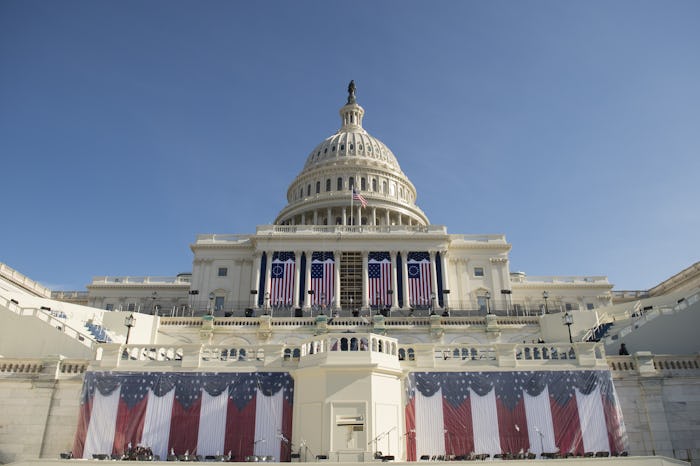News

What Happens If A President Commits Treason?
With evidence provided by the U.S. intelligence community being fueled by salacious rumors and calls that the election was "illegitimate" by Congressional Democrats, more Americans have stared to wonder whether the President-elect actually might have been compromised by Russia. If there turns out to be more to the story than unsubstantiated Beltway gossip, the government could be faced with a Constitutional crisis. What is the penalty for a president committing treason? There would be two separate phases to a president's prosecution — the political and the criminal.
Just to be clear, Trump has categorically denied all allegations of collusion, communication, or cooperation with Russia or its President Vladimir Putin. Trump's transition team has not responded to Romper's requests for comment regarding Trump's connection to Russia. In tweets, during last week's press conference, and through his representatives and spokespeople, Trump has condemned not just the accusations as "completely false," according to NPR, but he's also said his accusers are engaging in a political witch hunt in an attempt to discredit him and his presidency.
But 17 national intelligence agencies agree that Russia used cyber warfare to influence the election, and the CIA added that Russia influenced the election with the intention of helping Trump, according to the Boston Globe. Efforts to undermine investigations into Russian election hacking could, in and of themselves, rise to the level of treason, according to the Boston Globe.
So what would happen if suspicions and evidence continue to mount about Trump's ties to Russia?
According to the Constitutional Rights Foundation, the grounds for a presidential impeachment are outlined in the Constitution as "treason, bribery, and other high crimes and misdemeanors."
First, a majority of the House of Representatives would have to vote for impeachment, then a trial in the Senate would be held, according to the CRF, which stated that treason is defined in Article 3, Section 3, Clause 1 of the Constitution:
Treason against the United States, shall consist only in levying War against them, or in adhering to their Enemies, giving them Aid and Comfort. No Person shall be convicted of Treason unless on the Testimony of two Witnesses to the same overt Act, or on Confession in open Court.
A president is removed from office as a result of impeachment proceedings if found guilty by a two-thirds vote in the Senate, according to CRF, which also stated that, while Congress can remove a president from office, only criminal courts can hand down criminal penalties for impeachable offenses like treason.
Criminal treason charges brought the punishment of death in 1953 for Julius and Ethel Rosenberg, who were convicted of helping the Soviets get U.S. nuclear secrets.
NSA legal counsel Susan Hennessey told Forbes that, if true, the allegations against Trump would be very serious:
If there was any evidence that the Trump campaign actively colluded with Russia and committed crimes, that would be the most shocking political scandal in American history. It would be a betrayal not only of the American people, but of basic democratic values. If sufficient evidence emerges that the FBI has substantiated the allegations or is preparing criminal indictments, then even hardline Republicans in Congress will likely call for Governor Pence to take the oath of office.
Whether Americans will have to face the reality of a president being accused of treason remains to be seen, but it would certainly create an environment of uncertainly that could ripple throughout the U.S. government and beyond.